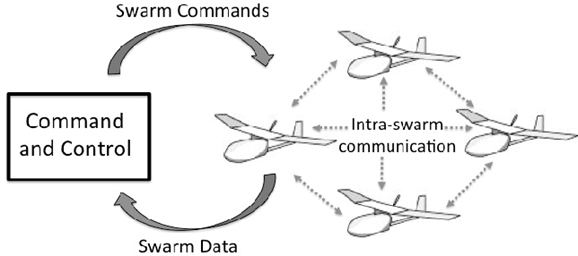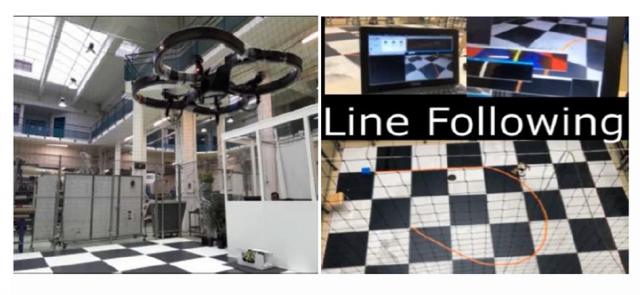TITLE : Distributed swarm UAV control architecture model platform design under communication delay constraints (ARCODISRONE)
Keywords: Swarm UAV, Modeling , Distributed control architecture, Time-dely.
Context of the Internship
During the twentieth century, Unmanned Aerial Vehicles (UAV), usually known under the name of drones, were employed exclusively in military applications. In the last two decades their use in civilian applications has increased exponentially. UAV’s devices are characterized by several features such as small sizes, highly speed maneuverability allowing them to achieve critical tasks quicky and efficiently. Thanks to these features, UAV’s nowadays are employed in promising applications including precision farming, inspection of potentially dangerous sites, food and medical delivery and Firefighting tasks [1] ( see Figure 1).
In spite of these several advantages and due to the lack of autonomy, employing single UAV device to achieve these missions can lead to the failure of the mission especially in the case where the UAV has to accomplish the requires tasks under severe constraints such as restricted allowed time to achieve the mission, or potential faults affecting the UAV structure. Therefore, swarm UAV’s which offer many features such as scalability, efficiency, redundancy and saving costs, is a promising approach for the purpose of achieving critical mission while preventing human being involved into hazardous and dangerous mission or interventions.
Purpose of the Internship
The goal of this internship is to design and setup a distributed swarm UAV control architecture model platform under communication delay constraints. To achieve this purpose, the successful candidate will investigate two main issues for the design of this control architecture. 1) The first issue concerns the kinematic and the dynamic modeling complexity of the UAV swarm. The goal of this task is to provide a distributed model for the swarm UAV which is a compromise between the modeling approach for single UAV which is based upon complex nonlinear model which involves several time-varying unknown parameters [2], and the classical multi-agents modeling approach which uses a simple 1st or 2nd order linear model to describe the UAV dynamics [3]. 2) The second issue concerns the communication network constraints of the distributed control architecture more specifically the potential time-delay which can affects the data transmission between each UAV belonging to the swarm [4] [5].
Internship work plan
The internship will be conducted by the successful candidate according to the following steps:
- Addressing the state-of-the-art of the different modeling approaches of an UAV swarm by comparing the advantages of each methods and studying the impact of UAV model parameters on the accuracy of the whole model of the swarm.
- Characterizing the time-delay ( known or unknown, bounds,..) affecting the transmission of some crucial data issued from the UAV flight controller such as the position and the attitude and incorporating this time-delay model in the whole UAV swarm control architecture.
- Design setup and validate the distributed UAV swarm platform under Matlab/Simulink Gazebo software.
- Experimental validation of the distributed control architecture on the UAV experimental platform of the laboratory IBISC.
Required profile
The successful candidate is required to be curious, motivated by the field of UAV control with the following skills:
- Master / Engineer with skills in UAVs, nonlinear control system theory and embedded control systems.
- Matlab/Simulink/Gazebo C++ , ROS soft programming.
- Good English level.
Supervisors and contact
Bibliographie
[1] Hassija, V.; Saxena, V.; Chamola, V. Scheduling drone charging for multi-drone network based on consensus time-stamp and game theory. Comput. Commun. 2019, (149), pp 51–61.
[2] Chen, F., Jiang, R., Zhang, K., Jiang, B., & Tao, G. (2016). Robust backstepping sliding-mode control and observer-based fault estimation for a quadrotor UAV. IEEE Transactions on Industrial Electronics, 63(8), pp 5044‑5056.
[3] Menard, T. Moulay, E,. Coirault, P. Defoort, M. Observer-based consensus for second-order multi-agent systems with arbitrary asynchronous and aperiodic sampling periods, Automatica, 2019, (99), pp 237-245.
[4] Kladis, P.G. Stabilization and Tracking for Swarm-Based UAV Missions Subject to Time-Delay. Applications of Mathematics and Informatics in Science and Engineering. 2014, Springer, pp 265–288.
[5] Quang,D.T., Rihab, ETH., Ahmed Ali, S., Guerin, F. Observer Design for a Class of Uncertain Nonlinear Systems With Sampled-Delayed Output Using High-Gain Observer and Low-Pass Filter: Application for a Quadrotor UAV. IEEE Transactions on Industrial Electronics, 2024, (71), pp 933-942.
- Date de l’appel : 23/11/2023
- Statut de l’appel : Non pourvu
- Contacts cotés IBISC : Sofiane AHMED-ALI (MCF HDR Univ. Évry, IBISC équipe SIAM), sofianeDOTahmedaliATuniv-evryDOTfr
- Sujet de stage niveau Master 2 (format PDF)
- Web équipe SIAM








